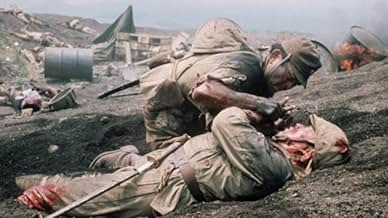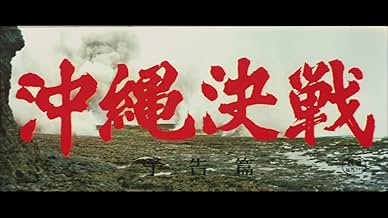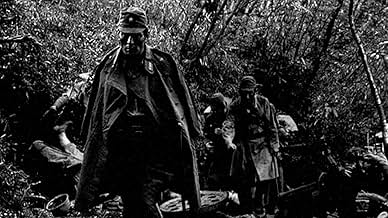IMDb RATING
6.9/10
510
YOUR RATING
Told from the Japanese perspective, this war drama captures the events of World War II's Battle of Okinawa - a massive amphibious assault by U.S. troops that left more than 150,000 Japanese ... Read allTold from the Japanese perspective, this war drama captures the events of World War II's Battle of Okinawa - a massive amphibious assault by U.S. troops that left more than 150,000 Japanese civilians dead.Told from the Japanese perspective, this war drama captures the events of World War II's Battle of Okinawa - a massive amphibious assault by U.S. troops that left more than 150,000 Japanese civilians dead.
- Director
- Writers
- Stars
- Director
- Writers
- All cast & crew
- Production, box office & more at IMDbPro
Featured reviews
The film is pretty bad across the board. Even ignoring the poor special effects due to budget, the direction and editing is poor. A tighter script and decent editing would have done wonders for what could have been a good film. The story line is grim, of course, but is badly handled and is an emotionless tale of waste. To get an emotional response from an audience you need to care about the characters, and that empathy is what the movie truly lacks. The film is a docudrama, but lacks drama and the power of a documentary. It's worth a look, but is certainly not a good film. Compare BoO with Story of a Prostitute, Fires on the Plain, or The Burmese Harp, and you'll understand why it is a forgotten film.
Little known but impressively detailed and completely uncompromising depiction of the battle of Okinawa from the Japanese perspective. I think it deserves a rerelease or more exposure, because as an antiwar film, it's very impressive, and even ahead of its time.
American war films were still a fair way off from showing war in a truly hellish manner at this point in film history- there's a real misery in this one that prevents any battle scenes from being fun or exciting to watch, even if there is a degree of spectacle due to the relatively high budget.
That sense of doom and inevitable loss, coupled with the savage violence that pulls absolutely no punches (it's comparable to Saving Private Ryan, yet came out over 1/4 of a century earlier) makes it a tough but engaging watch, and it mostly earns its lengthy runtime of 2.5 hours.
And of course, a war film like this shouldn't pull punches. It's generally far better to show war on film as ugly rather than exciting, especially a conflict like the one on Okinawa.
Characters are simple but serviceable, and despite the limited character development, you can feel some sympathy for them as individuals stuck in a conflict, whilst still feeling angry at the whole institution of war itself. The way it occasionally checked in on how civilians were coping was particularly powerful and unique, too.
American war films were still a fair way off from showing war in a truly hellish manner at this point in film history- there's a real misery in this one that prevents any battle scenes from being fun or exciting to watch, even if there is a degree of spectacle due to the relatively high budget.
That sense of doom and inevitable loss, coupled with the savage violence that pulls absolutely no punches (it's comparable to Saving Private Ryan, yet came out over 1/4 of a century earlier) makes it a tough but engaging watch, and it mostly earns its lengthy runtime of 2.5 hours.
And of course, a war film like this shouldn't pull punches. It's generally far better to show war on film as ugly rather than exciting, especially a conflict like the one on Okinawa.
Characters are simple but serviceable, and despite the limited character development, you can feel some sympathy for them as individuals stuck in a conflict, whilst still feeling angry at the whole institution of war itself. The way it occasionally checked in on how civilians were coping was particularly powerful and unique, too.
I bought this movie for a higher price than i'd care to admit, expecting a interesting take on the Battle of Okinawa with real facts and maybe some cool battle scenes. I was extremely disappointed.
Over the entire movie we are presented with the spiritually pure Japanese angels desperately fighting against those American Yankee murderers that only win the battle because they have unlimited ammo hack Thompson's that they spray and pray without discrimination, as well as some obligatory war crime weapons like chemical bombs. Which as a reviewer before mentioned was not even in use during the Okinawa invasion. I at the same time understand and hate the decision by movie-makers to portray ones own side in a better light than the other. But deliberately making your own side seem so good as it was presented in this movie is borderline historical revisionism. Which is a curse word in my dictionary.
One thing that irked me: Okinawan's were treated like trash by the Japanese during the actual invasion, yet here we are presented with Okinawan civilians that gets denied the great honor of joining the mass suicide of the Japanese soldiers, but eventually after proving their spirit the Japanese soldiers kindly allow them to use one of their grenades to off themselves. I have no doubts that some Okinawan's wanted to willingly kill themselves, but mainly the Okinawan's actually wanted to surrender to the Americans due to how crappy the Japanese treated them, using them as human shields and deliberately forcing them to kill themselves.
Also the combat scenes themselves mainly consists of the Japanese soldiers trying to get stabby stabby while the Americans use 2000 bullets on each of the Japanese in return. There is a lot of gore and blood everywhere, but it comes off as fake and stupid with the bad fighting choreography and the random narrator commenting on how "glorious" the Japanese defenders were.
I suspect the Japanese ultra-nationalists welcome this movie's inaccuracy, but at the same time it also fails as a entertaining movie. The document mixed with the bad acting makes this entire ordeal seem like a lifeless propaganda film that i could easily imagine being created by the actual WW2 Japanese government. That this was actually created 20 years afterwards is astonishing to me.
The history is not actually completely wrong, it is just glaced with lies to make it seem factual. That makes this the worst attempt at propaganda i have ever seen. And i hope that whoever Japanese director that wrote the line "this is the best war movie ever made" which made me buy the movie will be forced to watch Fires on the plain, letters of Iwo Jima or Stalingrad so he can see an actual good war movie and how pointless war actually is.
Man i could go on and on about how bad this movie is To sum it up, this is a stupid jingoistic and historically wrong document movie with many horrible combat scenes.
Over the entire movie we are presented with the spiritually pure Japanese angels desperately fighting against those American Yankee murderers that only win the battle because they have unlimited ammo hack Thompson's that they spray and pray without discrimination, as well as some obligatory war crime weapons like chemical bombs. Which as a reviewer before mentioned was not even in use during the Okinawa invasion. I at the same time understand and hate the decision by movie-makers to portray ones own side in a better light than the other. But deliberately making your own side seem so good as it was presented in this movie is borderline historical revisionism. Which is a curse word in my dictionary.
One thing that irked me: Okinawan's were treated like trash by the Japanese during the actual invasion, yet here we are presented with Okinawan civilians that gets denied the great honor of joining the mass suicide of the Japanese soldiers, but eventually after proving their spirit the Japanese soldiers kindly allow them to use one of their grenades to off themselves. I have no doubts that some Okinawan's wanted to willingly kill themselves, but mainly the Okinawan's actually wanted to surrender to the Americans due to how crappy the Japanese treated them, using them as human shields and deliberately forcing them to kill themselves.
Also the combat scenes themselves mainly consists of the Japanese soldiers trying to get stabby stabby while the Americans use 2000 bullets on each of the Japanese in return. There is a lot of gore and blood everywhere, but it comes off as fake and stupid with the bad fighting choreography and the random narrator commenting on how "glorious" the Japanese defenders were.
I suspect the Japanese ultra-nationalists welcome this movie's inaccuracy, but at the same time it also fails as a entertaining movie. The document mixed with the bad acting makes this entire ordeal seem like a lifeless propaganda film that i could easily imagine being created by the actual WW2 Japanese government. That this was actually created 20 years afterwards is astonishing to me.
The history is not actually completely wrong, it is just glaced with lies to make it seem factual. That makes this the worst attempt at propaganda i have ever seen. And i hope that whoever Japanese director that wrote the line "this is the best war movie ever made" which made me buy the movie will be forced to watch Fires on the plain, letters of Iwo Jima or Stalingrad so he can see an actual good war movie and how pointless war actually is.
Man i could go on and on about how bad this movie is To sum it up, this is a stupid jingoistic and historically wrong document movie with many horrible combat scenes.
From the director of the terrific "Japan's Longest Day", this is an ambitious documentary-styled recreation of the battle for Okinawa, where hundreds of thousands of soldiers and civilians were abandoned by the Japanese military in order to better protect the mainland. The soldiers fortified themselves in caves and fended of an overwhelming American attack over a period of several months. Unfortunately, the filmmaker's talents don't match their ambitions. "Japan's Longest Day" was a fascinating film written by Shinobu Hashimoto about a little known military revolt at the end of the war. Okinawa is dramatically inept with misplaced bits of humor, and the crowd scenes never number more than 50, making it seem far less epic than it purports to be. The photography is bland and the blood very fake. The desperation never seeps in like it should, but the film does a good job of showing what they went through. It also shows that when the going gets tough, the Japanese commit suicide - according to this film it must have been the leading cause of death. The events depicted are similar to "Sands of Iwo Jima" - so if you like that you might like this. Okinawa is still occupied by American forces. Script by Kaneto Shindo ("Onibaba").
This is an exhaustive (and exhausting) account of events surrounding the Battle of Okinawa, beginning with pre-invasion defense preparations (starting in July 1944), then moving to the aerial bombardment, to the US invasion, and finally to ground combat. In its desire to be "complete" and thoroughly document the battle (from the Japanese POV, of course), it shortchanges story and characters. It feels like three hundred mini-vignettes rapidly spat out by a machine gun rather than a smoothly flowing, cohesive whole.
As for historical context and accuracy, others have already pointed out their reservations about the Japanese being framed as noble, even heroic, warriors fighting the good fight against overwhelming odds. This complaint about its narrative framing also applies to virtually every Japanese film about World War II. In the collective cinematic imagination of Japanese WWII films, the "war" is treated almost as a cosmic, non-human, event that simply happens TO them. Unlike in many German films where characters ponder "will the world forgive us?" or "now our chickens are coming home to roost. We will now reap what we have sown", in Japanese films, it is almost always "oh poor us. We are losing. It's so sad. Why must we lose? What about our honor? What about our children?"
As for historical context and accuracy, others have already pointed out their reservations about the Japanese being framed as noble, even heroic, warriors fighting the good fight against overwhelming odds. This complaint about its narrative framing also applies to virtually every Japanese film about World War II. In the collective cinematic imagination of Japanese WWII films, the "war" is treated almost as a cosmic, non-human, event that simply happens TO them. Unlike in many German films where characters ponder "will the world forgive us?" or "now our chickens are coming home to roost. We will now reap what we have sown", in Japanese films, it is almost always "oh poor us. We are losing. It's so sad. Why must we lose? What about our honor? What about our children?"
Did you know
- TriviaDirector Hideaki Anno has mentioned that this is the film he has watched the most in his life, well over 100 times.
- ConnectionsReferenced in Twenty Years of African Cinema (1983)
- How long is Battle of Okinawa?Powered by Alexa
Details
- Release date
- Country of origin
- Language
- Also known as
- Bitka za Okinavu
- Production company
- See more company credits at IMDbPro
- Runtime
- 2h 29m(149 min)
- Color
- Sound mix
- Aspect ratio
- 2.40 : 1
Contribute to this page
Suggest an edit or add missing content



































